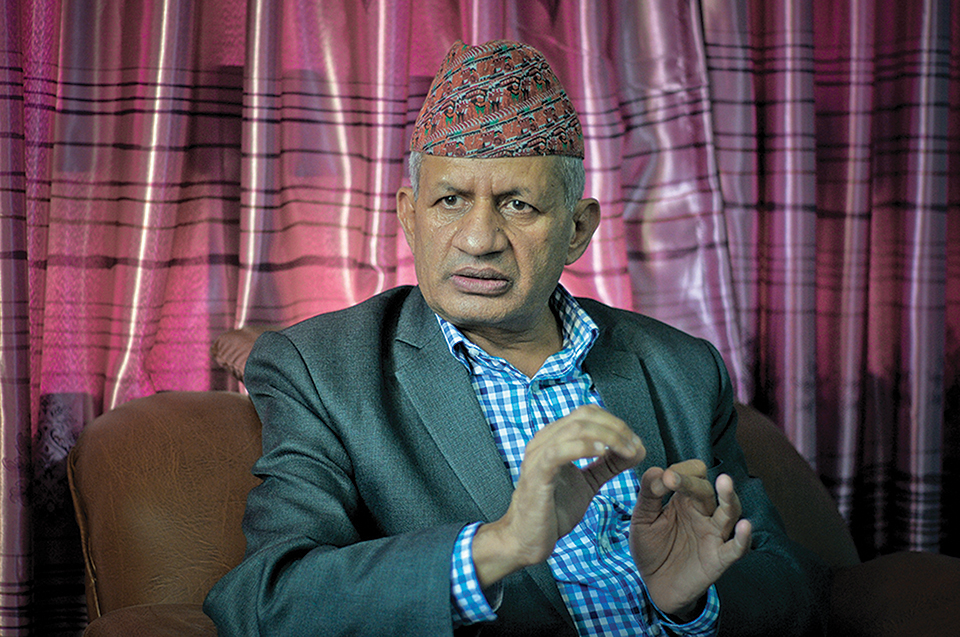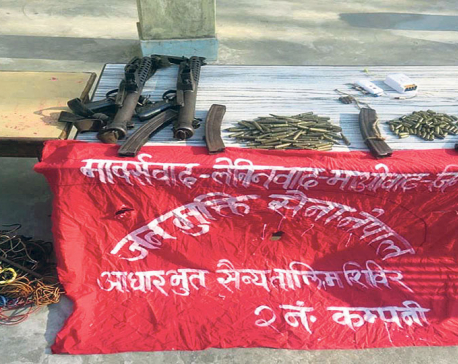
OR
Nepal is not tilting in any direction
Published On: October 2, 2019 09:00 AM NPT By: Ashok Dahal | @ashokpillar

Foreign Minister Pradeep Kumar Gyawali addressed the 74th session of the United Nations General Assembly in New York on Friday, where he raised issues ranging from climate change to terrorism to development. There, he also met with various leaders coming from different countries. What did they say about Nepal? Republica’s Ashok Dahal caught up with him on the sidelines of UNGA in New York to discuss various aspects of Nepal’s foreign relations.
What did Nepal actually achieve from this session of UNGA?
This session was marked by some special events. There was a high level climate summit and special summits on SDGs, financing for development and universal health coverage. Those four events were extremely important for Nepal. We expressed our views at the highest level because SDG is one of the best ever crafted documents of humanity, which, if properly implemented, can bring tremendous change in lives of human beings.
However, resource gap is extremely critical. That’s why all the events were mainly focused to appeal to the world community to bridge those gaps. Climate change is going to be the most serious challenge of this century not only for humanity but also for our planet. We expressed our concern about this too. The 74th session was focused on making more substantive collaboration for achieving the UN’s aims and aspirations. We were able to use this platform for our benefit. At the sidelines we held many bilateral meetings in which we tried our best to showcase our issues, expressed concerns and further consolidated relations with other countries. Nepal’s participation in UNGA has been meaningful and successful.
You said you met the leaders of various countries. What did they say?
I found that they have great support, goodwill, attraction and solidarity for Nepal. Our balanced foreign policy, the principle of ‘amity with all, enmity with none’, our hospitable people and our natural and cultural beauty have always fascinated global leaders. I got this impression while talking to them. Besides, Nepal’s uniquely successful resolution of conflict and peace process has also sent good message to the leaders around the globe. Our inclusive democracy and aspiration for economic growth are major attractions. We tried to showcase positive aspects to our friends. I requested my counterparts to enhance their substantive economic partnership with Nepal, especially by encouraging the business community of their respective countries.
While meeting my counterpart from the Mozambique, I knew that they were fascinated by our post-quake reconstruction process. Very recently they faced similar type of natural disaster due to hurricane and suffered the huge loss. So they wanted to see, hear and learn from the experiences of Nepal to build back better. We requested them to send the delegation so that they can see for themselves how our reconstruction work is meeting with success.
- Despite the differences, all member states have expressed commitment in favor of strong South Asian cooperation. They all advocated for reviving SAARC process.
- We should not be unnecessarily suspicious about the policy of a particular country. This does not help further strengthen our relations.
- Nepali communists fought for 70 years in the frontline against any type of autocratic regime. It is utterly ridiculous when our commitment to democracy is questioned.
You also underlined the need of economic cooperation through SAARC and BIMSTEC. But in the ministerial meetings at the sidelines of UNGA, India and Pakistan boycotted each other’s session. In this situation, how can SAARC be revived?
Nepal strongly believes in regional cooperation and multilateralism, because not one single country has enough capacity to tackle all the problems facing the humanity. Regional cooperations are important to address poverty, transnational crimes, terrorism, drug, human trafficking, adverse effect of climate change and many more. Forum like SAARC is for the same purpose.
SAARC was formed to create a stable, peaceful, integrated and prosperous South Asia. Questions are often raised about its efficiency and delivery but it was and still an excellent framework for regional cooperation. But for the last three years, there has been no progress on SAARC at all. Its summit has been postponed since 2016. And the reasons are not hidden anymore.
In the ministerial meeting, we were not expecting that all differences would be settled in New York. Declaring the date of summit was not in our agenda too. But despite the differences, all member states have expressed commitment in favor of strong South Asian cooperation. They all advocated for reviving SAARC process and talked about achievements under SAARC framework. There are different SAARC centers in almost all countries and every country is leading in a particular sector. So the institutions of SAARC are there in place but without the summit, SAARC cannot be revitalized. So we urge all member states to narrow down their differences, negotiate with each other or at least not let shadows of differences and tensions eclipse SAARC process.
Do you think as a chair of SAARC Nepal can mediate for peace between India and Pakistan?
As a peace-loving country and having excellent relations with both India and Pakistan we wish they understand each other better. I believe that sooner or later both sides will be able to seek some way forward because the cost of tension and the cost of the conflict and hostility is beyond the capacity of South Asia. Despite having so many potentials the regional trade is lagging behind, the inter-regional trade investment is minimal. And the largest sum of poverty is here.
If they cannot address the problem history will question their capability. Nepal is optimistic that India and Pakistan will sort out their differences. History has the examples of countries passing through confrontation, bloodsheds, even full-fledged war eventually coming to the table of cooperation and partnership.
In Kathmandu, there have been various interpretations about Nepal’s commitment, or lack thereof, to America’s Indo-Pacific Strategy. You also met president Trump in UNGA. What is Nepal’s official position on IPS?
There have been various interpretations and allegations against the government on this matter either because of misinformation, misperception, misunderstanding or lack of knowledge. I take you to the recently published interview of the US ambassador. He has clearly mentioned that IPS is a policy, not an alliance or block where other countries are requested to join. There is no any provision to join this strategy. It is not a military strategy. So it is not a ‘Rananiti’ (strategy) but just a ‘Niti’ (policy).
We should not be unnecessarily suspicious about the policy of a particular country. This does not help further strengthen our relations. United States is one of the major development partners of Nepal and we have an excellent development partnership and friendship for the last seven decades. From malaria eradication to the biggest ever grant under Millennium Challenge Corporation (MCC), the US has always been very supportive. Our focus should be to foster substantive economic partnership with the US. Big countries may have their own priorities and policies but Nepal’s focus is on economic cooperation. We should not create unnecessary controversy through exaggerations.
But ruling party itself seems to have created the controversy by launching training program on ‘Xi Jinping Thought.’ People are questioning about erosion of democratic values in the party.
Again, such concerns are the product of misunderstanding or lack of understanding or biased mindset. Nepali communists fought for 70 years in the frontline against any type of autocratic regime—from Rana rule to Panchayat to monarchy. We were front runners. We have sacrificed. So if anybody questions our democratic commitment, it is either due to ignorance or prejudice.
We are in favor of the innovative implementation of Marxism according to ground reality of Nepal. We have discarded any particular model of socialism or any particular path of revolution. We have developed our own policies and programs. Our constitution, which envisions socialism with democracy, has safeguarded universally accepted democratic values such as pluralism, multi-party competitive democracy, separation of powers, press freedom and others. And these are the outcomes of our struggle for freedom and democracy. This is why it is utterly ridiculous when our commitment to democracy is questioned.
As for learning from the best practices, we can do so from any country in the world.
We have learnt from democratic virtues of America. Abraham Lincoln’s definition of ‘by the people for the people and of the people’ has inspired us greatly. We were inspired by the virtues of liberty and equality of French Revolution. We were inspired by the UK’s Magna Carta and non-violence of Mahatma Gandhi. Regarding China, like it or not, it made an unprecedented and unimaginable progress within a very short span of time. More than 800 million people have been lifted from poverty. So what’s wrong in learning from Chinese development? Or there is nothing we can learn from China? It is quite natural for Nepal to learn from miraculous development of China. Now some have interpreted the event as Nepal tilting toward China. Nepal does not tilt to any country. Nepal stands as Nepal.
You also mentioned the peace process and transitional justice issues during your address in the UNGA. But back home there is little progress on the ground.
We are in the final stage of appointing officials at TJ bodies. We have to appoint professional team in both of the commissions and then we have to amend the TJ law according to the Supreme Court verdict and the concerns of the victims. We are in regular consultations with the victims as well as the international community.
Let me assure the people through your press, as I assured in UNGA address, that we will conclude this final leg of the peace process with equally capable team, in line with the spirit of comprehensive peace agreement, our international commitments, verdict of Supreme Court, concerns of the victims and reality on the ground.
You May Like This

Mysterious disease killing dogs in Norway
HELSINKI, Sept 8: Norwegian authorities haven’t been able to detect the cause behind an unexplained disease that is estimated to... Read More...

Smugglers’ go-downs near customs office
SIRAHA, March 16: On March 10, a team from the District Police Office (DPO), Siraha, arrested a truck with an... Read More...

Govt restricts Chand group’s activities
KATHMANDU, March 13: The government on Tuesday outlawed the ‘political activities’ of the semi-underground Communist Party of Nepal led by... Read More...










Just In
- NRB introduces cautiously flexible measures to address ongoing slowdown in various economic sectors
- Forced Covid-19 cremations: is it too late for redemption?
- NRB to provide collateral-free loans to foreign employment seekers
- NEB to publish Grade 12 results next week
- Body handover begins; Relatives remain dissatisfied with insurance, compensation amount
- NC defers its plan to join Koshi govt
- NRB to review microfinance loan interest rate
- 134 dead in floods and landslides since onset of monsoon this year








Leave A Comment